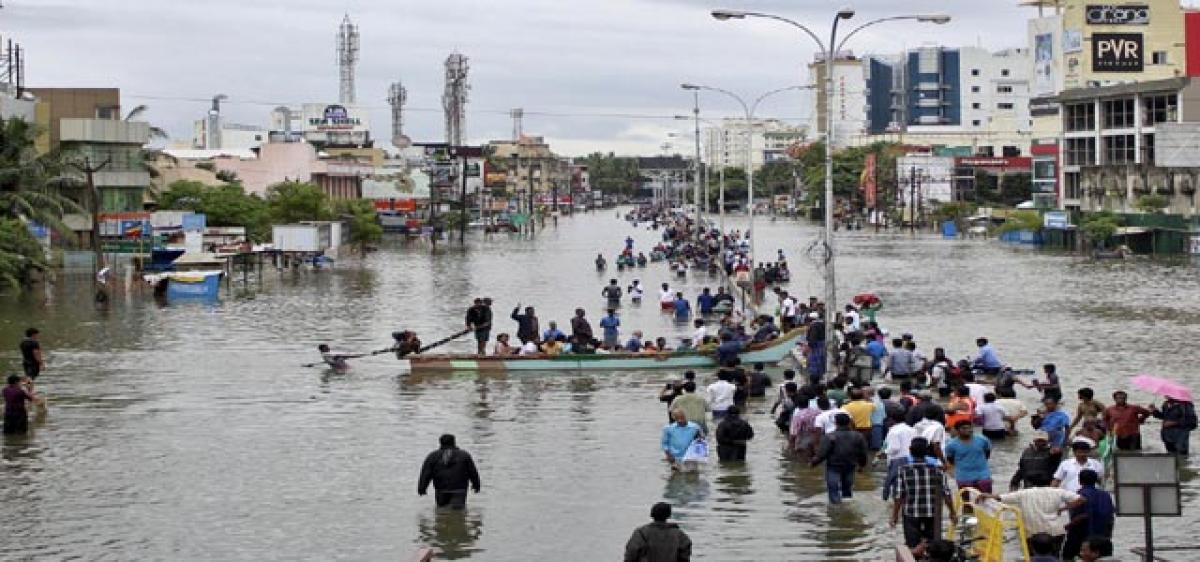Live
- Supreme Court issues notice on PIL seeking directions to integrate legal education, self-defence training into school curriculum
- Bengal school jobs case: Arpita Mukherjee granted bail; new HC Bench to look into Partha Chatterjee's plea
- Working to provide social security for gig and platform workers: Govt
- Bangladesh records 11 dengue deaths, toll rises to 459
- Vocera Raises $500K from Y Combinator to Revolutionize Voice AI Testing and Evaluation
- GQG Partners Refuses to Sell Adani Stocks Despite Bribery Scandal and 26% Loss
- Bihar: Four persons including girl injured in post bypolls violence in Gaya
- Dharmasthala Dharmadhikari Enters Record Book
- BJP to Review By-election Losses in State Meet
- Activist Alleges CPCB Cover-up on Endosulfan in Kasaragod
Just In

While environment diplomacy at the UN climate change conference in Marrakech last November became uncertain after Donald Trump, a climate change sceptic, won the US presidential elections, experts have suggested that India must tread its own path and start investing to prepare for the future.
While environment diplomacy at the UN climate change conference in Marrakech last November became uncertain after Donald Trump, a climate change sceptic, won the US presidential elections, experts have suggested that India must tread its own path and start investing to prepare for the future.
“India needs to invest in infrastructure and prepare itself to face climatic repercussions this year. During the drought last year, the country's net water reserve capacity was only 20 per cent; in March, hailstorms destroyed the wheat crop,” Sanjay Vashist, Director, Climate Action Network South Asia, said.
Over 330 million people in India were affected by one of the worst droughts that spilled over to neighbouring Sri Lanka, Bangladesh and Nepal as well. Experts like S.K. Sarkar, Director, Water Division, at The Energy and Resources Institute (Teri), had cautioned that by 2050, India will be water-scarce.
“Extreme events which are more random now force millions to migrate -- and for Bangladesh and Nepal, India is the destination. India needs to pull up its socks. We just faced cyclone Vardha, Chennai Floods in 2015 were devastating and so on,” Harjeet Singh, Global lead on Climate Change at Action Aid, said.
A study released at the 22nd Conference of the Parties to the UN Framework Convention on Climate Change (COP22) at Marrakech, Morocco, says that natural disasters annually force about 26 million people into poverty. Both the economic and human cost due to such disasters are underestimated by 60 per cent.
“The impact of extreme natural disasters is equivalent to a $520-billion global loss in annual consumption,” a World Bank report said at COP22. It also noted that poor people pay the heaviest price. According to the World Meteorological Organisation (WMO), the global temperature is 1.2 degrees Celsius above the pre-industrial level, making 2016 the warmest year followed by 2015 and 2014. The Island Nations now fear of their existence.
“We have to start worrying about such trends. India need to focus on mitigation or adaptation if the environmental damage is irreversible... our solution will depend on resources and we have other priorities like food security,” said Karan Mangotra, from TERI's Centre for Global Environment Research. According to Mangotra, to avoid such dangerous trends, India needs to streamline all regulatory aspects for collective efforts, strengthen research capabilities and evolve a business model for affordable technology.
In the midst of all this, with Trump's triumph, the Paris agreement that aims at keeping the global temperature rise this century well below 2 degrees Celsius above pre-industrial levels and to pursue efforts to limit the temperature increase even further to 1.5 degrees Celsius as also the developed world's $100 billion per year commitment for the developing nations for switching to greener technologies, could be curtailed.
“What we saw at Marrakech has to be operationalised, but embracing Paris Agreement under Trump's administration is highly unlikely, especially given the key people he is appointing to his office like the CEO of ExxonMobile,” Harjeet Singh said. A UN report has estimated the requirements of developing countries at between $140 billion and $300 billion by 2030 and between $280 billion and $500 billion by 2050 to make up for the climate change.
The report also held lack of funds as a major stumbling block in meeting goals under the Paris Agreement and said that developed countries have failed to undertake the measures required to achieve the global temperature goals. “For India, clearly finance remains an important issue... most of the economic sectors in India depends on weather. If the US does pull out of the Paris deal, a huge financial burden will be created; India has to be ready,” Singh said.
India at COP22 was praised for its commitments and initiatives in clean energy and coal dependency reduction and it was said that the country is set to “over-achieve” its emission intensity targets. The Government also approved the negotiating position adopted by India at the 28th Meeting of the Parties to the Montreal Protocol held last year in October at Kigali in Rwanda. The Montreal protocol aims to phase out the ozone depleting substances (ODS).
Meanwhile, Union Environment Minister Anil Madhav Dave also hinted at India's preparedness as 2016 ended. “If Bengaluru wants to save itself from 2017 monsoon floods then it will have to unclog the drains,” the minister, who had listed the Bengaluru crisis as a “preferred task” while taking office in July 2016, said in a tweet on New Year's Eve.
By Kushagra Dixit

© 2024 Hyderabad Media House Limited/The Hans India. All rights reserved. Powered by hocalwire.com







